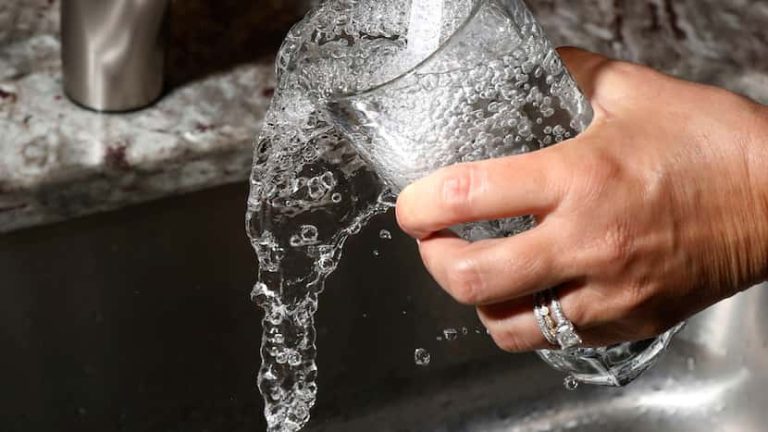Tap water can be contaminated with harmful man-made chemicals that take decades to break down.
Test results released this year by the U.S. Environmental Protection Agency found that 47 water systems in Texas had unacceptable levels of so-called “forever chemicals.”
More than 10 of these locations are located in North Texas, including major cities like Dallas, Irving, Arlington and Fort Worth, as well as smaller towns like Prosper, Seagoville, Grapevine and Flower Mound.
How harmful are the chemicals? No one knows for sure, but scientists warn that they could have adverse effects on our health, including heart disease, cancer, immune disorders, diabetes and infertility, among other things.
One estimate I saw suggests that water only accounts for 20% of our intake, with the remaining 80% coming from other sources.
These chemicals are in our water supplies, in flame retardant products, in food packaging, Teflon-coated cookware, carpet cleaners, dental floss, outdoor clothing, medical devices, straws, pizza boxes, paints, medicines, pesticides, artificial turf, stain-control products, cosmetics, and more. They’re in our homes and maybe even our bloodstream.
Watchdog has been following the issue for months, but didn’t realize how widespread the problem was until now: Sixteen of Texas’ 47 water systems (known to date) have major environmental problems, and that list doesn’t include many local water utilities that have yet to be inspected.
To combat this, the EPA announced new testing and safety regulations in April that will take effect in five years, giving water systems time to clean up. But it’s a Herculean task, especially considering that there are more than 12,000 man-made chemicals, and the tests only look for six specific chemicals.
The American Water Works Association estimates it could cost $40 billion to treat so-called PFAS chemicals in water systems, plus another $3 billion a year in maintenance.
Who pays? Look in the mirror.
Due to spill
This is an example of humans being too clever. This chemical was first invented in the 1930s by DuPont chemist Roy J. Plunkett, who is credited with inventing Teflon.
3M became a major manufacturer of PFAS compounds after a chemist accidentally spilled one of the chemicals on a sneaker, which left behind a coating that repels oil and water. Legend has it that this is how Scotchgard was born.
Cities develop strategies
Fort Worth has hired a consultant to do a treatability study. Fort Worth sells water to other area cities, but those cities aren’t on the list of high levels found in the tests because they haven’t been tested yet. Most of the systems are expected to be tested by the end of next year.
“We know that new regulations will be difficult to meet when they come into effect, so we’re working to establish processes to accommodate them,” said Mary Gugliuzza, a spokeswoman for the Fort Worth Water Department..
Dallas water officials say they are building PFAS testing into their systems to investigate possible sources of PFAS and prevent exposure.
On its website, the Dallas Water Authority promises: “DWU continues to comply with all current regulations that apply to drinking water and will comply with all regulations in the future.”
How to Avoid PFAS
Can you avoid these chemicals? Most water filters won’t work. Bottled water doesn’t always work either. It all depends on the water source.
Experts recommend activated charcoal filters, but they’re not foolproof.
These chemicals are not only found in our water and consumer products, but also in our air, soil and food.
Learn about products that contain PFAS, such as Teflon, Scotchgard, and Gore-Tex.
Consider stainless steel or cast iron pots and pans.
Keep an eye on advances in treatment solutions at your municipal water supplier. Find out when testing is done and if the results are above or below the “MCL” (Maximum Contaminant Level).
ask a question.
Does your water contain PFAS chemicals?
The U.S. Environmental Protection Agency has released a list of about 50 water systems in Texas where high levels of hazardous chemicals have previously been found.
The list below includes the names of affected water systems in North Texas as accurately listed on the EPA website.
The EPA points out that these test numbers are not real-time, so some systems may have tested high at one time but may not currently be at the same high levels.
- Thrive
- Dallas Water Authority
- Duncanville
- Seagoville
- Cockrell Hill
- Farmers Branch
- Irving
- Flower Mound
- Greenville
- Grapevine
- Terrell
- Weatherford
- Arlington
- Fort Worth
- Haltom City
- Lake Worth
Become a citizen of Watchdog Nation.
Learn how to become a super consumer with Dave Lieber.
Watchdog Newsletter: To stay up to date, sign up for The Watchdog’s free weekly newsletter, click here.
Subscribe: Please support The Watchdog’s brand of honest journalism designed to save you time, money and frustration. Please take advantage of our digital subscription (and make him look great!) https://dallasnews.com/subscribe
Watchdog Homepage: You can’t afford to miss Watchdog’s two weekly reports, so make sure to follow us to stay up to date with the latest news. Watchdog A homepage featuring all the latest columns.
Check out Dave’s free training video: https://youtu.be/uhUEUCNKGjc
Facebook: Connect with The Watchdog on our Facebook group: search “DallasNews Watchdog Posse.”
Dallas Morning News The Watchdog column won the National Society of Newspaper Columnists’ Best Column Writing Award in 2019. The competition judges called his winning piece “an example of suspenseful storytelling and public service.”
Read his award-winning column:
* Helping the widow of Dallas police officer J.D. Tippit, murdered by Lee Harvey Oswald, be buried next to her late husband
* Help a waitress who was victimized by a shady used car dealer

